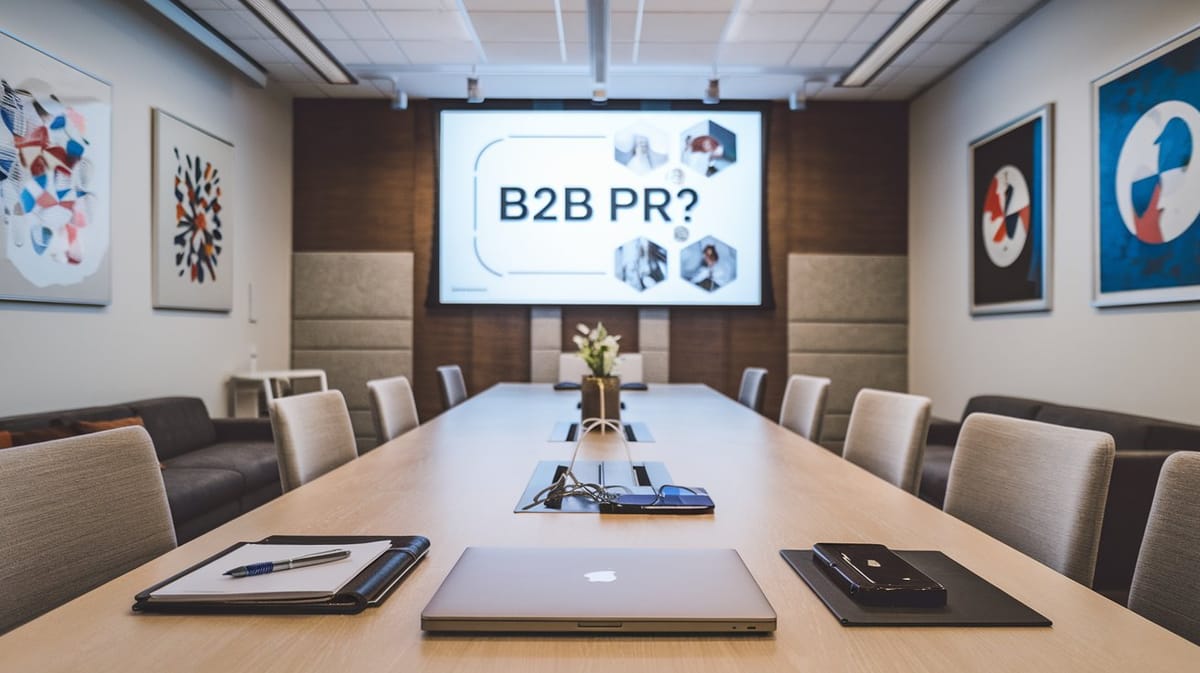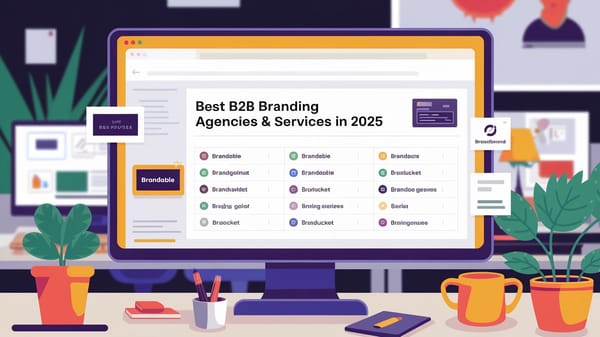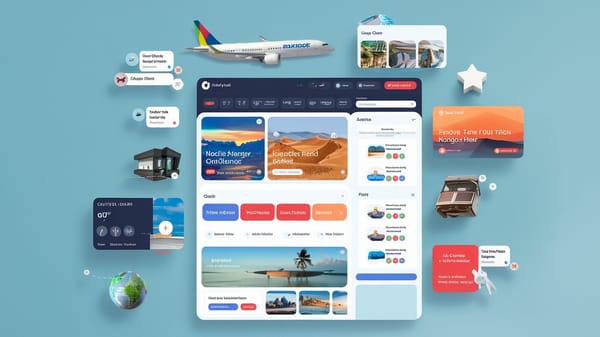What is B2B PR?

In the dynamic landscape of business-to-business (B2B) interactions, public relations (PR) plays a pivotal role in shaping perceptions, building trust, and driving business growth. A B2B PR strategy is designed to promote an organization, its products, and services to other businesses, while also establishing the company as a thought leader within its industry. This strategic approach aims to generate positive media coverage, enhance brand reputation, and ultimately contribute to the organization's bottom line.
Unlike business-to-consumer (B2C) PR, which focuses on engaging individual consumers, B2B PR targets decision-makers, professionals, and organizations within a business environment. The primary objective is to foster trust, credibility, and positive sentiments among key stakeholders, thereby creating opportunities for lucrative business prospects and partnerships.
An effective B2B PR strategy encompasses various tactics, including press releases, bylined articles, media relations, and reputation management efforts. It also leverages digital platforms, as highlighted by Mageplaza, where marketing decision-makers increasingly favor micro-blogging, social media, and podcasting over traditional channels. This shift underscores the importance of agility and flexibility in modern PR campaigns, as noted by CSG, where a structured approach may not always be feasible in today's fast-paced environment.
A successful B2B PR campaign not only showcases expertise in the target market but also builds lasting relationships and differentiates the organization from its competitors. For instance, Dropbox's #LifeInsideDropbox campaign is a notable example of a B2B PR strategy that effectively highlights company culture and attracts new talent through engaging content and storytelling.
You can also visit Oncely.com to find more Top Trending AI Tools. Oncely partners with software developers and companies to present exclusive deals on their products. One unique aspect of Oncely is its “Lifetime Access” feature, where customers can purchase a product once and gain ongoing access to it without any recurring fees. Oncely also provides a 60-day money-back guarantee on most purchases, allowing customers to try out the products and services risk-free.
Oncely are hunting for the most fantastic AI & Software lifetime deals like the ones below or their alternatives:

Table of Contents
- Understanding B2B Public Relations
- Defining B2B PR
- Key Components of B2B PR
- The Role of B2B PR in Building Trust and Credibility
- Challenges and Trends in B2B PR
- The Value of B2B PR for Companies
- Key Strategies and Tactics in B2B PR
- Audience Research and Analysis
- Building Relationships with Journalists and Media Outlets
- Leveraging Influencer Collaborations
- Hosting B2B Events
- Implementing a Long-Tail PR Strategy
- Measuring PR Campaign Effectiveness
- Crafting Thought Leadership Content
- Utilizing Data-Driven Strategies
- Engaging in Media Monitoring
- Partnering with B2B PR Agencies
- Benefits and Importance of B2B PR
- Enhancing Corporate Reputation
- Building Trust and Credibility
- Increasing Brand Visibility and Awareness
- Facilitating Strategic Networking
- Supporting Crisis Management
- Leveraging Data-Driven Insights
- Enhancing Market Insights and Adaptability
- Strengthening Relationships with Investors
- Conclusion
Understanding B2B Public Relations
Defining B2B PR
Business-to-Business Public Relations (B2B PR) is a strategic communication process that focuses on managing and enhancing a company's reputation and relationships within the business sector. Unlike Business-to-Consumer (B2C) PR, which targets individual consumers, B2B PR is aimed at decision-makers, industry professionals, and organizations. The primary goal is to establish trust, credibility, and positive sentiment among these stakeholders, ultimately fostering business opportunities, partnerships, and industry influence (Zen Media).
B2B PR involves a range of activities, including media relations, thought leadership campaigns, influencer engagement, and participation in industry events. These efforts are designed to create an environment conducive to the exchange of goods, services, partnerships, and collaboration among companies in similar industries (Zen Media).
Key Components of B2B PR
A successful B2B PR strategy is built on several key components that align with a company's overall business objectives. These components include:
-
Defining PR Goals: Establishing clear PR objectives is crucial for guiding PR activities. These goals should align with the company's broader business objectives and provide a clear direction for PR efforts. Common goals include increasing brand awareness, generating leads, building thought leadership, and managing reputation (Orange Owl Marketing).
-
Identifying Target Audience: Understanding the target audience is essential for tailoring PR efforts effectively. In B2B PR, the audience typically includes potential clients, industry analysts, media outlets, and business partners (Orange Owl Marketing).
-
Developing Key Messages: Crafting clear, consistent, and concise key messages is vital for effective PR communication. These messages should resonate with the target audience and reinforce the company's brand identity (Orange Owl Marketing).
-
Building a Media List: Establishing relationships with key publications and reporters is a necessary precondition for securing credible and targeted media coverage. A well-curated media list can simplify the placement process and add clout to the company as a go-to resource for journalists (Sagefrog).
-
Media Monitoring: Keeping track of media coverage and public sentiment is essential for evaluating the effectiveness of PR efforts and making necessary adjustments. Media monitoring helps companies stay informed about industry trends and competitor activities (Sagefrog).
The Role of B2B PR in Building Trust and Credibility
B2B PR plays a crucial role in building trust and credibility with partners, clients, and other stakeholders. By consistently delivering the right message to the right audience at the right time, companies can enhance their reputation and establish themselves as thought leaders in their industry (Zen Media).
Trust and credibility are particularly important in the B2B marketplace, where the buyer's consideration and decision process is heavily influenced by a company's stature and reputation. A sound PR strategy can help companies gain and retain the respect of target audiences, business partners, distributors, and other key stakeholders (Sagefrog).
Challenges and Trends in B2B PR
The B2B PR landscape is constantly evolving, with new challenges and trends emerging regularly. Recent market trends have added several layers of complexity to B2B PR strategies. Businesses are pivoting, client expectations are changing, and the digital transformation is reshaping the way companies communicate with their audiences (Elevation Marketing).
One of the biggest challenges in B2B PR is securing media coverage in a saturated market. To overcome this challenge, companies must prioritize outreach to industry trade outlets and business publications, which are more likely to reach the target audience of B2B buyers and decision-makers (Elevation Marketing).
Another trend in B2B PR is the increasing importance of agility and flexibility. In the past, PR campaigns were often planned and executed according to a precise schedule. However, in today's fast-paced business environment, a more agile approach is often necessary to respond to changing circumstances and seize new opportunities (Zen Media).
The Value of B2B PR for Companies
B2B PR is valuable for companies because it helps create a positive image and strengthens relationships with current and potential clients, customers, and partners. A well-executed B2B PR campaign can build trust and credibility, provide market insights, increase brand visibility, and educate the public about the company's offerings (Zen Media).
Moreover, B2B PR enables companies to respond quickly to customer feedback, keep decision-makers informed about changes in the external environment and business trends, and prevent costly legal issues. It can also help build relationships with investors by informing them of newsworthy milestones or developments (Zen Media).
In conclusion, B2B PR is a strategic and targeted approach to managing a company's public image and reputation within the business sector. By focusing on building trust and credibility with key stakeholders, companies can enhance their reputation, foster business opportunities, and achieve their marketing goals.
Key Strategies and Tactics in B2B PR
Audience Research and Analysis
Audience research and analysis are foundational strategies in B2B PR, as they provide insights into the target market's needs, preferences, and pain points. This understanding allows B2B public relations professionals to tailor their messaging and content to maximize impact. By conducting thorough audience analysis, businesses can identify the most effective channels and messages to reach decision-makers and influencers within their industry. This approach ensures that PR efforts are not only targeted but also resonate with the intended audience, enhancing engagement and conversion rates (Ninjapromo).
Building Relationships with Journalists and Media Outlets
Establishing strong relationships with journalists and media outlets is a critical component of a successful B2B PR strategy. In a competitive media landscape, securing coverage in reputable publications can significantly enhance a company's credibility and visibility. By cultivating relationships with key reporters and editors, businesses can position themselves as go-to resources for industry insights and news. This proactive approach not only simplifies the media placement process but also increases the likelihood of being featured in high-profile outlets (Sagefrog).
Leveraging Influencer Collaborations
Influencer marketing has become an integral part of B2B PR strategies, leveraging the trustworthiness and reach of industry experts and thought leaders. Collaborating with influencers allows businesses to introduce their brand to a wider audience and sway public opinion through credible endorsements. Identifying the right influencers and crafting a strategic partnership can amplify a company's message and enhance its reputation within the industry. This approach is particularly effective in niche markets where influencers hold significant sway over purchasing decisions (Ninjapromo).
Hosting B2B Events
Hosting B2B events, whether in-person or virtual, provides businesses with opportunities to foster meaningful connections with their target audience. These events serve as platforms for networking, knowledge sharing, and showcasing products or services. By organizing events that align with industry trends and innovations, companies can position themselves as thought leaders and gain valuable insights into market needs and gaps. Additionally, events can generate media coverage and create buzz around a brand, further enhancing its visibility and credibility (Ninjapromo).
Implementing a Long-Tail PR Strategy
A long-tail PR strategy involves targeting a broader array of niche publications and industry-specific outlets that the target audience reads. This approach allows businesses to generate more qualified leads and establish themselves as experts in their field. By focusing on niche media, companies can reach decision-makers who are more likely to be interested in their products or services. Additionally, staying on top of trending topics and news stories related to the industry can provide opportunities for newsjacking, where businesses offer unique perspectives to journalists, gaining valuable exposure (Zenmedia).
Measuring PR Campaign Effectiveness
Measuring the effectiveness of B2B PR campaigns is crucial for optimizing return on investment (ROI). Key metrics such as website traffic, lead generation, and media coverage quality provide valuable insights into the impact of PR efforts. By analyzing these metrics, businesses can make data-driven decisions to refine their strategies and improve future campaigns. Additionally, proactive crisis management and adapting to evolving PR trends are essential for maintaining a positive brand image and ensuring long-term success (Ideagrove).
Crafting Thought Leadership Content
Creating high-quality, informative content is a powerful way to establish authority and influence brand perception in the B2B landscape. Thought leadership content not only builds trust with the audience but also attracts media attention and backlinks from other sources, boosting credibility. By consistently producing valuable content that addresses industry challenges and trends, businesses can position themselves as leaders in their field and foster stronger relationships with clients and partners (Ninjapromo).
Utilizing Data-Driven Strategies
In the digital age, data-driven strategies are essential for effective B2B PR. By leveraging data analytics, businesses can gain insights into audience behavior, campaign performance, and market trends. This information allows for more precise targeting and personalization of PR efforts, increasing the likelihood of success. Data-driven strategies also enable businesses to identify opportunities for improvement and innovation, ensuring that their PR campaigns remain relevant and impactful in a rapidly changing environment (Ninjapromo).
Engaging in Media Monitoring
Media monitoring is a vital tactic in B2B PR, allowing businesses to track their brand's presence and reputation across various channels. By keeping an eye on media coverage, social media mentions, and industry discussions, companies can gauge public perception and respond to any negative feedback or misinformation promptly. Media monitoring also provides insights into competitors' activities and industry trends, helping businesses stay ahead of the curve and adapt their strategies accordingly (Sagefrog).
Partnering with B2B PR Agencies
For many businesses, partnering with a B2B PR agency can be a strategic move to enhance their public relations efforts. These agencies bring years of expertise and a network of media and influencer connections, crafting tailored strategies that position businesses in the best possible light. By collaborating with a PR agency, companies can benefit from professional guidance, access to industry insights, and the ability to focus on core business activities while leaving PR management to the experts (Elevation Marketing).
Benefits and Importance of B2B PR
Enhancing Corporate Reputation
In the realm of business-to-business (B2B) public relations, corporate reputation is a pivotal asset that significantly influences a company's ability to attract and retain clients and talent. A strong reputation can lead to increased business resilience, greater customer loyalty, and a competitive advantage in crowded markets. In the digital age, reputation can be rapidly amplified or damaged on online platforms, making effective management a strategic imperative. Companies recognized for their integrity, quality, and reliability find it easier to navigate market challenges and can command premium pricing, directly impacting profitability and long-term sustainability (Markeding.io).
Building Trust and Credibility
B2B PR is essential for fostering trust and credibility among stakeholders, which is crucial for long-term business success. By engaging in strategic communication processes, companies can build mutually beneficial relationships with clients, suppliers, and government entities. This trust is cultivated through consistent and transparent communication, which helps in establishing thought leadership and enhancing business reputation (Zen Media). Trust and credibility are not only vital for maintaining existing relationships but also for attracting new business opportunities and partnerships.
Increasing Brand Visibility and Awareness
One of the primary objectives of B2B PR is to increase brand visibility and awareness among industry peers and potential clients. This is achieved through various strategies such as media relations, thought leadership campaigns, and participation in industry events. By positioning the company as a leader in its field, B2B PR helps in gaining industry exposure and building trust among partners (Press Connect). Enhanced visibility not only strengthens the brand's market presence but also facilitates the exchange of goods, services, and partnerships among companies in similar industries.
Facilitating Strategic Networking
B2B PR plays a crucial role in facilitating strategic networking by building strong relationships with key stakeholders. This includes media relations, influencer engagement, and participation in industry events. By leveraging these connections, companies can effectively manage their relations with stakeholders, mitigate potential risks, and enhance their industry standing (Markeding.io). Strategic networking not only helps in maintaining a positive image but also opens up new avenues for collaboration and growth.
Supporting Crisis Management
Effective crisis management is an integral component of B2B PR, helping companies navigate challenging situations while maintaining their reputation. By implementing a thoughtful PR plan that includes crisis management strategies, businesses can build trust and credibility in competitive markets. This involves engaging in corporate storytelling and timely press releases to keep the brand relevant and respected among industry peers and customers (Markeding.io). Proactive crisis management ensures that companies are prepared to respond quickly to any issues that may arise, thereby minimizing potential damage to their reputation.
Leveraging Data-Driven Insights
B2B PR strategies are increasingly relying on data-driven insights to optimize their effectiveness. By analyzing data from previous campaigns, companies can make informed decisions for future PR efforts. This approach allows businesses to tailor their communication strategies to resonate with their target audience, ultimately enhancing their credibility and visibility (Press Connect). Data-driven insights also enable companies to measure the effectiveness of their PR campaigns, ensuring a higher return on investment.
Enhancing Market Insights and Adaptability
B2B PR provides valuable market insights that help companies stay informed about changes in the external environment and business trends. By keeping decision-makers up-to-date, B2B PR enables companies to respond quickly to customer feedback and adapt to evolving market conditions (Zen Media). This adaptability is crucial for maintaining a competitive edge and ensuring long-term success in the dynamic business landscape.
Strengthening Relationships with Investors
A well-executed B2B PR campaign can also strengthen relationships with investors by informing them of newsworthy milestones or developments. By maintaining open lines of communication, companies can build trust and credibility with investors, which is essential for securing funding and support for future growth initiatives (Zen Media). Strong investor relations contribute to a company's financial stability and long-term sustainability.
Conclusion
In summary, B2B PR is a vital component of a company's overall strategy, offering numerous benefits that contribute to business success. From enhancing corporate reputation and building trust to increasing brand visibility and facilitating strategic networking, B2B PR plays a crucial role in shaping a company's image and establishing its position within the industry. By leveraging data-driven insights and engaging in proactive crisis management, companies can ensure their PR efforts are effective and aligned with their broader business objectives.





